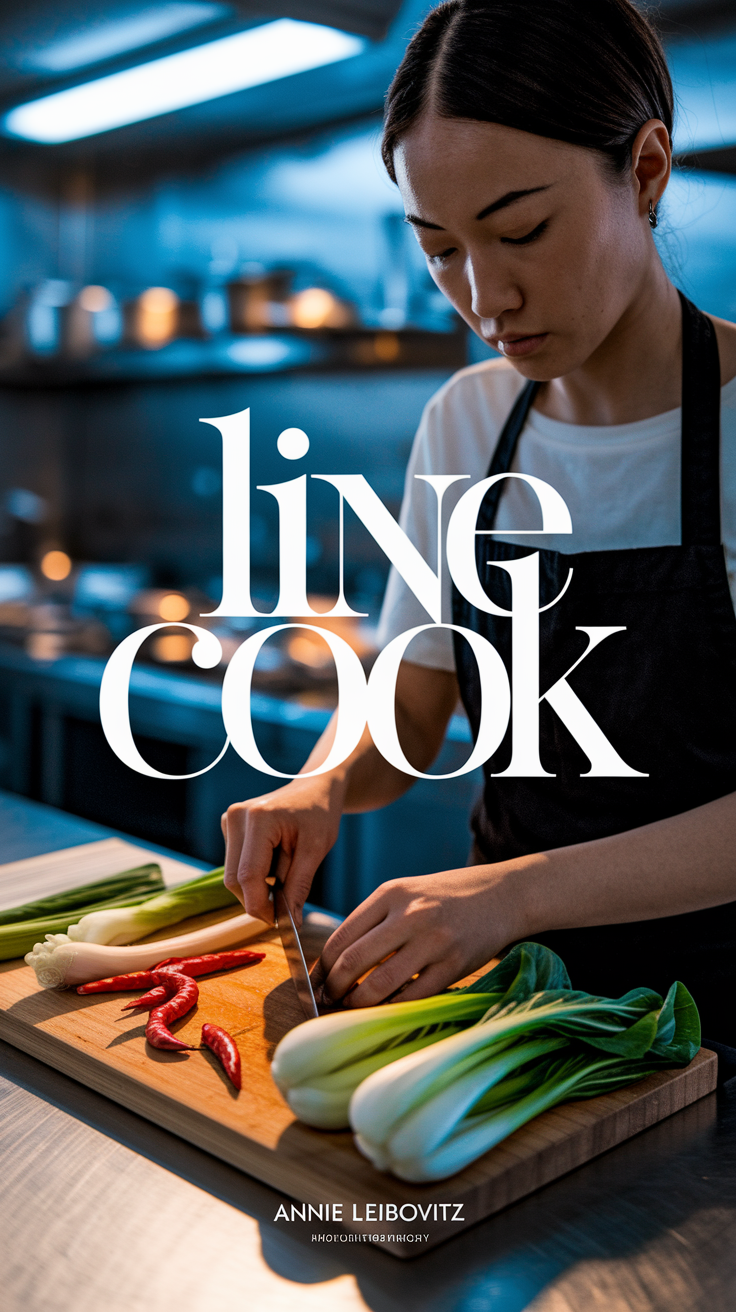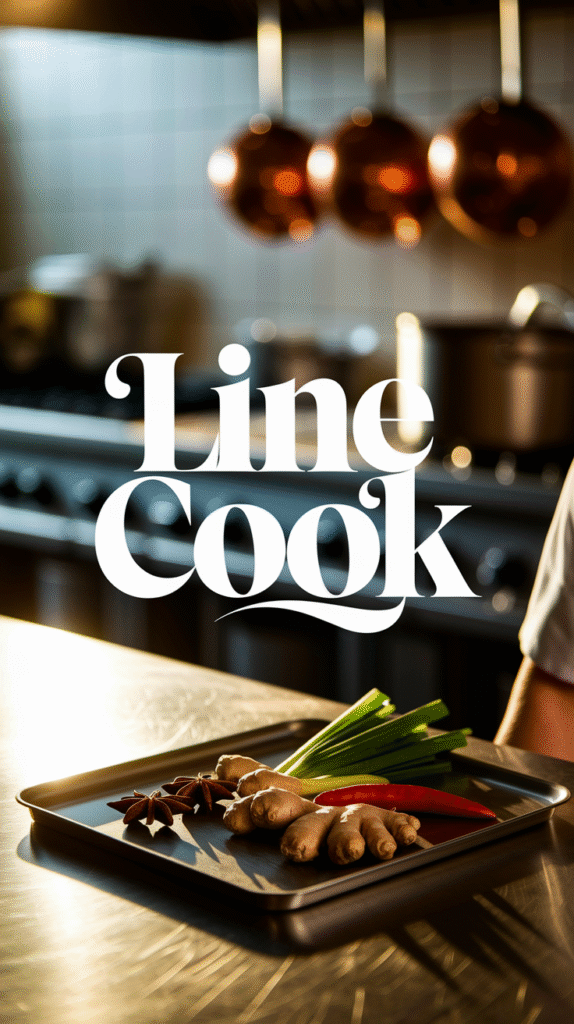A line cook plays a vital role in the culinary world. They are the backbone of any restaurant kitchen, responsible for preparing dishes, maintaining cleanliness, and ensuring that every plate looks and tastes amazing. To thrive as a line cook, certain essential skills must be mastered. Here’s a look at those skills that can elevate a line cook’s career.
1. Culinary Techniques
Every line cook needs a solid understanding of basic culinary techniques. This includes:
- Knife Skills: Precision in chopping, dicing, and slicing is fundamental. Mastering proper techniques helps ensure safety and efficiency.
- Cooking Methods: Grilling, sautéing, baking, and steaming are essential methods. Understanding how and when to use each technique can enhance flavor and presentation.
- Flavor Pairing: Knowing which ingredients complement each other is crucial for creating delicious dishes.
2. Time Management
In the high-pressure environment of a kitchen, time management is critical. A line cook must master the following:
- Prioritizing Tasks: Quickly assessing which dishes need to be prepared first is essential.
- Multitasking: Working on several dishes simultaneously while maintaining quality is key in a busy kitchen.
- Timing: Understanding how different cooking times affect dish quality can make or break a service.
3. Attention to Detail
Every component of a dish matters. Line cooks must develop a keen eye for detail to excel. Consider these aspects:
- Presentation: Dishes must be visually appealing. Thoughtful plating can elevate a meal from ordinary to extraordinary.
- Ingredient Quality: Ensuring freshness and quality in all ingredients is crucial. This directly impacts flavor and customer satisfaction.
- Consistency: Customers expect the same taste and presentation every time they visit. Consistency is essential for building a loyal clientele.
4. Communication Skills
Effective communication in the kitchen ensures smooth operations. Here are some aspects to focus on:
- Team Coordination: Understanding the roles of fellow kitchen staff and collaborating effectively can enhance workflow.
- Feedback Reception: Accepting constructive criticism graciously contributes to personal and professional growth.
- Instruction Following: Being able to follow instructions from chefs or sous chefs is essential for maintaining consistency and quality.
5. Cleanliness and Food Safety
Health and safety standards must be adhered to in the kitchen. A line cook should know:
- Sanitation Practices: Keeping workstations clean reduces the risk of foodborne illnesses.
- Proper Storage: Understanding how to store food safely can prevent spoilage and contamination.
- Handling Allergens: Knowing how to handle food allergies can protect both customers and the establishment.
6. Adaptability and Problem-Solving
The ability to adapt to changing circumstances is invaluable. Line cooks should hone these skills:
- Flexibility: Being open to last-minute changes or special requests can enhance the dining experience.
- Creativity: Coming up with alternative solutions when things go wrong helps keep operations running smoothly.
- Resourcefulness: Making the most of available ingredients can minimize waste and keep costs down.
7. Passion for Food
A true passion for food shines through in every dish. This enthusiasm can be infectious and inspire the entire kitchen team. Cultivating a love for culinary arts can lead to:
- Continuous Learning: Seeking out culinary classes or workshops shows commitment to personal growth.
- Innovation: Experimenting with flavors and techniques can lead to exciting new dishes and specials.
- Inspiring Others: A passionate cook can uplift their team and create a positive work environment.
For those looking to pursue a career as a line cook, mastering these skills will pave the way for success. Aspiring cooks should consider joining a culinary school or seeking mentorship from seasoned professionals. Websites like Culinary Schools offer resources to help new cooks learn and grow. Additionally, groups like National Restaurant Association Educational Foundation provide valuable information on food safety and kitchen management.
Building your skill set is an ongoing journey. Each day in the kitchen brings new challenges and learning opportunities. By focusing on these essential skills, line cooks can enhance their capabilities and advance their careers.
A Day in the Life of a Line Cook: Challenges and Rewards
Imagine stepping into a bustling kitchen filled with energy, the smell of fresh ingredients wafting through the air, and the sound of pots and pans clanging. This is a glimpse into the life of a line cook. For those who are passionate about food and cooking, being a line cook offers both challenges and rewards that shape their day in remarkable ways.
Starting early in the morning or late in the afternoon, a line cook’s shift often begins before the restaurant opens to customers. Prep work is crucial, as it lays the foundation for an efficient service. Chopping vegetables, marinating proteins, or preparing sauces not only ensures everything is ready but also helps to understand the day’s menu. This initial hustle sets the tone for everything that follows.
As the orders start coming in, things can quickly become hectic. Line cooks must work swiftly and efficiently. Here are some common aspects of their responsibilities:
- Plate Assembly: Line cooks are responsible for assembling dishes as per specific orders, ensuring that every plate meets the restaurant’s standards.
- Timing: Managing cooking times is critical. Dishes need to be ready at the right moment, especially during busy hours.
- Communication: Clear communication with team members, including servers, is essential to handle orders smoothly.
- Quality Control: Ensuring every dish has the right flavor and presentation is a top priority.
The fast-paced environment of a kitchen can lead to stress. Line cooks must be able to think on their feet and adapt to unexpected challenges like equipment malfunctions or last-minute changes to orders. It’s not uncommon for a dishwasher to break down or for a key ingredient to run out, requiring quick problem-solving skills to keep things running smoothly.
However, amidst the chaos, there are substantial rewards. Many line cooks find immense joy in creating culinary art and watching customers relish their dishes. The sense of accomplishment after a busy service is exhilarating. Moreover, working alongside other passionate chefs fosters a strong sense of camaraderie. This bond often helps to ease the pressure of the kitchen, as everyone supports one another through busy nights.
Career growth also awaits dedicated line cooks. Starting as a line cook can open doors to more advanced cooking positions, such as sous chef or head chef. Learning essential cooking techniques while under the guidance of seasoned chefs equips them with valuable skills that could shape their careers.
During their shifts, line cooks are also in constant motion, which can be good for physical fitness. On average, they may spend hours on their feet, which helps burn calories compared to a sedentary desk job.
Here’s an overview of a typical day in the life of a line cook:
| Time | Activity |
|---|---|
| 8:00 AM | Arrive and prepare by setting up the workstation. |
| 9:00 AM | Prep ingredients for the day, ensuring freshness. |
| 11:00 AM | Complete prep and communicate with the team about the day’s specials. |
| 11:30 AM | Lunch service begins; take orders, start cooking. |
| 2:00 PM | Lunch service concludes; clean workspace. |
| 4:00 PM | Prep for dinner; review inventory and restock necessary items. |
| 5:30 PM | Dinner service begins; fast-paced order management. |
| 10:00 PM | Service ends; cleaning up and closing the kitchen. |
The life of a line cook is undoubtedly challenging, but it is equally rewarding. For anyone passionate about the culinary arts, working as a line cook offers much more than working with ingredients—it’s a journey of creativity and collaboration. For those considering this route, resources like Food & Wine or Culinary Schools can provide valuable insights into culinary education and career advancement.
In the vibrant world of hospitality, line cooks play a vital role in delighting diners and creating memorable experiences. The challenges they face daily only add to the joy of crafting dishes that bring happiness to others, making the line cook profession a truly enriching experience.
The Importance of Teamwork in the Kitchen
In the bustling world of food preparation, the role of every line cook is crucial. But what often goes overlooked is the significant impact of teamwork among kitchen staff. A kitchen thrives not just because of singular talent but because of the collective efforts that contribute to creating a seamless dining experience. Whether in a fine dining restaurant or a busy café, collaborating with teammates can enhance overall efficiency, boost morale, and elevate the quality of food served.
The Dynamics of Kitchen Teamwork
Every line cook plays a specific role within the kitchen hierarchy. These roles include positions such as:
- Prep Cook
- Sous Chef
- Pastry Chef
- Expediter
Each position requires different skills, but what ties them together is the reliance on one another. For instance, a prep cook ensures that all ingredients are ready, while the sous chef oversees the line cooks during service hours. When each person performs their duties effectively, it results in a smooth operation.
Effective Communication
Communication is the backbone of effective teamwork. In a kitchen environment, mistakes can happen quickly if team members aren’t on the same page. Clear communication helps to:
- Reduce errors in orders
- Ensure timely service
- Enhance food quality
For example, a line cook needs to communicate with the expediter about the readiness of dishes. If they can convey this clearly, the wait staff will receive dishes promptly. This leads to satisfied customers and better reviews.
Building Trust and Camaraderie
Trust between team members is vital in a kitchen setting. When line cooks trust one another, they are more likely to ask for help when needed or step in to assist a colleague. This spirit fosters a sense of camaraderie that can boost morale, making work more enjoyable and productive.
Additionally, events like team-building activities or kitchen competitions can enhance this camaraderie. They create opportunities for line cooks to bond outside of stressful service hours, reinforcing their teamwork skills.
Efficiency and Time Management
In a high-paced environment like a kitchen, efficiency is paramount. Teamwork promotes better time management by dividing tasks effectively. Line cooks working alongside each other can complete more in less time compared to individuals working in isolation.
| Task | Individual Completion Time | Team Completion Time |
|---|---|---|
| Preparing Vegetables | 30 minutes | 15 minutes |
| Cooking Pasta | 20 minutes | 10 minutes |
| Plating Dishes | 25 minutes | 12 minutes |
This table highlights how teamwork can significantly reduce the time spent on various tasks in the kitchen, allowing for more meals to be prepared efficiently.
Quality Control
When line cooks work together, they also ensure a higher standard of quality control. Each member can double-check the work done by others, offering feedback and corrections when necessary. This collaborative effort results in consistently high-quality dishes that delight patrons.
Moreover, sharing tips and techniques among line cooks helps them grow professionally. When cooks mentor each other, they can elevate the entire kitchen’s skill level, contributing to exceptional culinary offerings.
Acknowledging the Importance of Team Spirit
A line cook’s environment can be intense, but fostering an atmosphere of teamwork can make a significant difference. Recognizing the contributions of every kitchen staff member boosts morale and creates a supportive environment. A little appreciation can go a long way in ensuring that every cook feels valued.
Teamwork is not just a buzzword; it’s the heart of kitchen operations. Successful line cooks understand that they are part of a larger machine that functions best when all parts work together harmoniously.
For further insights into culinary teamwork, check out Culinary Schools and Food & Wine.
Navigating Stress and Time Management as a Line Cook
Being a line cook is a demanding job that combines culinary artistry with fierce time management and the ability to handle stress. Mastering these elements is crucial to thriving in this fast-paced kitchen environment. Whether you are new to the culinary world or a seasoned professional, understanding how to navigate stress and effectively manage your time can significantly enhance your performance and satisfaction on the job.
Understanding Your Work Environment
The kitchen is often bustling with energy, and it can become overwhelming during peak hours. A line cook must get accustomed to the noise, heat, and busy atmosphere. Here are some essential aspects to keep in mind:
- Fast-paced environment: Orders come in quickly, and the pressure mounts as customers anticipate their meals.
- Multitasking: Line cooks often manage several tasks simultaneously, from prepping ingredients to plating dishes.
- Teamwork: Building good relationships with coworkers is essential for a smooth operation.
Time Management Tips
Time management is a crucial skill for a line cook. Efficiently using every moment helps keep the kitchen running smoothly. Here are some strategies to optimize your time:
- Prioritization: Identify tasks that must be completed first and focus on those. For instance, prep items for dishes that will be served early in the service.
- Mise en place: Prepare and organize ingredients before the rush. This practice allows for quicker service and less stress.
- Set time limits: Assign specific time frames for tasks. For example, spend no more than 10 minutes on a specific dish during peak times.
- Minimize distractions: Limit chatting or unnecessary movements during service hours to maintain focus.
Managing Stress Effectively
Stress can lead to mistakes, impacting food quality and service speed. Here are methods to reduce stress as a line cook:
- Stay organized: Keep your workstation tidy. A clutter-free space helps reduce anxiety.
- Practice deep breathing: Take a few moments to breathe deeply to help calm your nerves during tense moments.
- Learn to say no: If your plate is full and someone asks for additional help, kindly decline or ask them to wait until you’re available.
- Seek support: Don’t hesitate to ask your team for help when the workload becomes overwhelming.
Physical and Mental Health
Being a line cook takes a toll on both your body and mind. It’s essential to emphasize your health while managing stress:
- Stay hydrated: Drink plenty of water throughout your shift to maintain energy levels.
- Healthy meals: Opt for nutritious foods that provide sustained energy rather than sugary snacks that lead to crashes.
- Physical exercise: Engage in regular physical activity outside of work to combat the physical demands of cooking.
- Mental breaks: During breaks, take time away from the kitchen, as it can help refresh your mind.
Building Resilience
Resilience is a line cook’s best friend. Facing challenges with a positive attitude can significantly alter your experience in the kitchen:
- Reflect on experiences: After a hectic shift, think about what went well and what could improve.
- Maintain a positive mindset: Focus on the joy of creating delicious meals rather than just the pressure of the hustle.
- Learn from mistakes: Appreciate the learning opportunities that come from errors or challenging shifts.
For line cooks looking to excel and manage stress effectively, resources are available online. Websites like Serious Eats can offer valuable culinary insights, while The Kitchn provides various recipes and tips for kitchen efficiency. You can also explore the Culinary Institute of America for formal training and professional development.
Embracing the challenges of being a line cook can lead to a rewarding and fulfilling career. With effective time management and stress navigation, you can thrive in this dynamic field.
Career Advancement Opportunities for Line Cooks in the Culinary World
For those in the culinary field, becoming a line cook is often the first step in a rewarding career. Line cooks play a vital role in the kitchen, preparing dishes, ensuring quality, and maintaining a high standard of service. But what happens after that initial role? Below are some exciting career advancement opportunities for line cooks in the culinary world, demonstrating how you can climb the kitchen ladder.
1. Advancement to Sous Chef
After gaining experience as a line cook, one of the most common pathways is to become a sous chef. The sous chef acts as the right hand of the head chef, overseeing kitchen operations and team management. This role requires strong leadership skills and the ability to multitask. To become a sous chef:
- Continue developing culinary techniques and specialty dishes.
- Take on additional responsibilities, such as training new cooks.
- Show initiative by suggesting menu ideas or improving kitchen operations.
2. Head Chef or Executive Chef
With enough experience, dedication, and skill, a line cook can eventually rise to the position of head chef or even executive chef. This is the highest-ranking culinary position in a restaurant, responsible for menu creation, kitchen staff management, and maintaining food quality. Here’s how to prepare for this prestigious role:
- Acquire management skills through workshops or courses.
- Network with professionals in the industry.
- Keep honing your cooking techniques and stay updated on culinary trends.
3. Specialized Chef Roles
Some line cooks may choose to specialize in a particular area of the culinary arts. Specializing can lead to unique career paths, such as:
- Pâtissier: A pastry chef focusing on desserts and pastries.
- Sous-Chef de Cuisine: A right-hand chef who focuses on managing the kitchen.
- Personal Chef: Providing customized meal preparations for individuals or families.
Specialization often requires additional training or experience but opens doors to unique opportunities.
4. Culinary Consultant
For those who want to step outside the kitchen but remain in the culinary field, becoming a culinary consultant is an option. Consultants help restaurants improve their menu, training, and kitchen operations. This role requires:
- Extensive culinary knowledge and experience.
- Strong communication skills for collaborating with various teams.
- Business acumen to understand the operations of various establishments.
5. Starting a Restaurant or Food Business
If you have a passion for entrepreneurship, you might consider starting your own restaurant or food business. This ambitious step comes with challenges but can be highly rewarding. Useful tips include:
- Drafting a solid business plan.
- Understanding the financial aspects of running a business.
- Choosing the right location and target market.
6. Food Stylist or Food Writer
Those with a flair for presentation and a love for writing can transition to food styling or writing about food. Food stylists prepare dishes in an appealing way for photography, while food writers create content related to culinary topics, such as recipes or restaurant reviews.
7. Formal Education Opportunities
Pursuing further education can also help line cooks advance their careers. Consider attending culinary schools or food science programs to boost your skills and resume. Schools such as the Culinary Institute of America and James Beard Foundation offer valuable programs in various areas of culinary arts.
Building a Network
As you look for advancement opportunities, focusing on building a professional network within the culinary world is equally important. Here are some effective ways to expand your connections:
- Attend culinary festivals and events.
- Participate in local chef associations.
- Engage on social media platforms, including Instagram and LinkedIn.
Career advancement for line cooks is filled with numerous possibilities. Understanding these paths and continuing to hone your skills will propel your culinary career to exciting new heights. Whether you’re looking to elevate to a leadership position or specialize in a particular niche, dedication and passion are key.
| Career Path | Skills Needed |
|---|---|
| Sous Chef | Leadership, multitasking |
| Executive Chef | Management, culinary creativity |
| Culinary Consultant | Culinary knowledge, communication |
Embrace the journey and keep on growing in your craft!
Conclusion
Being a line cook is both challenging and rewarding. It demands a unique set of skills, including knife proficiency, cooking techniques, and the ability to multitask in a fast-paced environment. Each day in the kitchen presents its own set of challenges, from managing time efficiently during dinner rushes to maintaining high standards of food quality. The satisfaction of successfully serving a well-prepared dish amidst the chaos is a key highlight of this profession.
Teamwork is essential in the culinary world, and as a line cook, you become a vital part of a larger team. Collaboration with chefs, servers, and fellow cooks helps create a seamless dining experience for customers. Supporting one another not only enhances efficiency but also fosters a positive work atmosphere.
Handling stress is another crucial aspect of the job. Developing effective strategies for time management can significantly alleviate pressure during peak hours. Techniques such as prioritizing tasks and maintaining a calm demeanor can lead to better performance and job satisfaction.
For those passionate about cooking, the line cook position serves as a stepping stone to greater opportunities. From becoming a sous chef to eventually running your own kitchen, there are numerous pathways for career advancement in the culinary field.
Ultimately, the life of a line cook is a journey filled with growth, challenges, and camaraderie. Embracing the skills learned along the way, building strong relationships, and managing stress effectively can set you on a path toward not only becoming a successful line cook but also opening doors to future culinary adventures.







